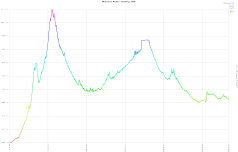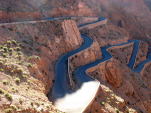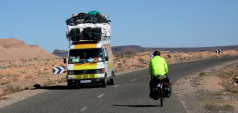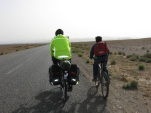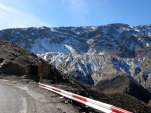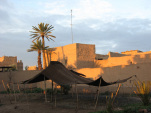Morocco 2008 Atlas Crossing

| Length | Starts in | Ends in |
| 551 Km (342 miles) | Marrakech, Morocco | Errachidia, Morocco |
This is a trip I did with my girlfriend in December 2008. The initial plan was to go from Marrakech to Fez in about 8 days, crossing the Atlas mountains. However it soon became clear that this would not be feasible because of the little amount of daylight at that time of the year (cycling at night in Morocco is NOT an option). So we decided to shorten the route and do Marrakech to Errachidia, taking there a bus to Fez (an experience on its own) and spending a day as regular tourists in Fez. In retrospective this was a very good idea as the most interesting sights are in the Marrakech - Errachidia part. We crossed the Atlas mountains through the highest mountain pass in Morocco, Tiz n Tichka and we then proceeded to the Kashbah route from Ouarzazarte to Errachidia. While on this route we also took some time to cycle through the famous Dades and Todra gorges.
This was also the first self-supported trip. We carried a 3-people tent we used to camp in several places, although we also rented a room in a couple of occassions. Other camping equipment we carried was two sleeping mats and bags, several kitchen utensils and a multi-fuel stove for cooking. All these added considerable weight to our bikes, something we probably underestimated a little bit!
Some notes about cycling in Morocco
The traffic
Morocco is known for having a significant rate of traffic accidents. In general Moroccan drivers do not completely adhere to the road rules (to put it succinctly). Also, less travelled roads outside main cities are usually poorly maintained, sometimes unmarked and full of potholes.That being said, we didn't find any major problems in our trip. Most of the time drivers were sympathetic with us, leaving a reasonable distance between the car and us when overtaking. From our experience we can say that as long as there is enough space on the road (be it either a wide road or a free lane in the opposite direction) there shouldn't be any problems. The problems come when the road is narrow or the opposite lane is full of cars: drivers will not stop and expect you to get out of the way so they can pass. Bear this in mind as it will save you a couple of heart attacks while on the road. Also, trucks can be a problem as they usually make less effort to safely overtake you, and some of them are so huge and go so fast that even the air turbulence they leave behind can de-stabilize you.
In general most of the drivers were very supportive, cheering us and beeping (in a nice way) as they pass. This was particularly encouraging while climbing the Atlas, where a lot of people (including a couple of police cars) rolled down the window and yelled to us Bon courage! as they passed by.
Do NOT cycle during night time. It doesn't matter how many lights or reflective material you wear, it is simply not safe!
Safety
Violent crime is rare in Morocco, and even more so against foreigners. The main problem for a foreigner travelling to Morocco is going to be petty crimes such as opportunity thefts and so. Being relatively vigilant will make your trip much more enjoyable.During our trip we camped on three ocasions. In this trip we decided to play it safe and not camp completely in the wild, as we didn't know how safe this might be or if it would create problems with the authorities. However only once we stayed in a proper camping site, the other two times we paid a small "fee" to camp in private property. This is common practice in Morocco and arrangements to camp in private backyards or similar can always be made. On the other hand, from what be have seen in our trip, free camping in the wild is definitely doable as long as you get away from the main roads and the villages.
The people
Although increasingly more common, most moroccans are not used to touring cylists (at least in the area we cycled). This is not to say that they are not used to tourists, but most of them travel by bus or in big 4WD convoys. Thus you should expect a lot of curiosity and weird looks from the locals. We also had children cycle with us for some time, and the ones that don't cycle will wave at you restlessly until you wave back!In general, you can expect two types of people. There are some that will approach you with genuine curiosity and ask you about your trip, your bikes and where are you from. Others will either nag you from the start to sell you something or appear friendly at first to inmediatly afterwards try to pitch their sale. We tried to be polite with everybody, but the moment someone started nagging us we went our way! We felt that the more off the tourist route the village was, the better the people.
The weather
We had good luck with the weather, mostly sunny days with the odd overcast sky. Temperatures during daytime were in the 15-20 degree celsius range (remember this was in December). Nights were really cold, not only high up in the Atlas but also during the rest of the trip. Pack appropriately!We didn't have much wind, but with our bulky luggage event the smallest breeze can be a pain as a headwind. In one ocasion we had a wonderful strong tailwind that allowed us to clock 30+ Km/h speeds without much effort!
Trip details
-
Day 1: Marrakech - Middle of nowhere (somewhere in the Atlas near Toufliht). 68.4 Km.
We left Marrakech about 9ish, although it took us a while to get out of
the city. After a couple of failed attempts we found the N9 road and
we were on our way!. The road to the Atlas is straight and full of palm
trees. It is actually quite nice to cycle it and after you leave the
outskirts of Marrakech the traffic drops noticeably. We had an excellent
(and cheap!) lunch at a petrol station bar.
After about 30Km the real climbing part starts. Fortunately the road is wide and well maintained, so stopping for a rest is not a problem. As the sun was setting we starting looking for a place to sleep. There was a hostel in a village we passed by, but they asked for an unreasonable price (they probably thought we'd pay anything because there were not any other hotels nearby..ha!). So we continued and pitched out tent in the backyard of an empty house. We paid 10 dirhams (about 1 euro) to the house guard to let us stay there. The backyard was looking directly to the Atlas valley with Marrakech barely visible at the horizon - impressive scenery!

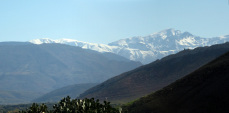
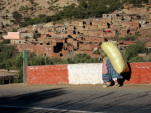
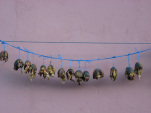

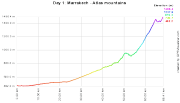
GPS track -
Day 2: Climb to the top and descent to Amerzgane. 96.4 Km. We started early and after
an early descent (exasperating because we knew we had to re-climb that) we started the real climb.
We had an early lunch at Taddart and continued our way up to the top. The climb is demanding (more so
if you are loaded with luggage!) but not impossible. Just before the top there is a small plateau where
you will see some snow (in the right time of the year), but don't be confused, the real summit is after
a short but steep climb. At the top there is a small esplanade with a plaque that confirms that this
is in fact the summit. We didn't stay long there as it was full of people nagging us for buying random
handcrafted crap. The descent was mostly without problems, but there are some bumps and small hills
that might be annoying, particularly after a big climb. In any case, it is a very beautiful route
that passes by several pintoresque small villages. Amerzgane is a small town with a couple of
restaurants and little else. The city itself offers no accomodation options, but there's a small
hotel 10 Km before it. We rented a "room" (i.e: 4 walls and a ceiling, no bed or anything else) from one
of the restaurants owners for about 40 dirhams.

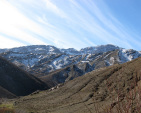
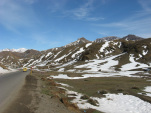
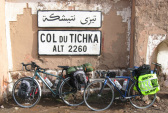
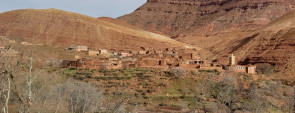

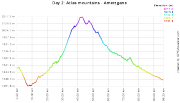
GPS track -
Day 3: Amerzgane - Skoura. 71.3 Km. After an early breakfast (bread from the local bakery and
jam) we continued to Ouarzazate. From there we took the N10 road to Skoura. Ouarzazate marks the start
of the Kasbah route; in particular Ouarzazate's Kasbah is quite spectacular and worth a visit. Up till
Skoura the N10 is relatively flat and easy to cycle. Since it was Christmas eve we decided to splurge a little
bit and sleep at a Kasbah in the outskirts of Skoura.


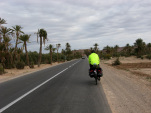
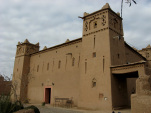
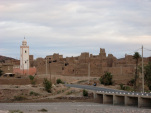
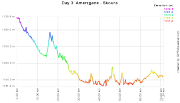
GPS track -
Day 4: Skoura - Dades Gorge. 92.4 Km. From Skoura we continued on the N10 until Boulmane Dades. At this
city we made a detour and took the route to the famous Dades gorge. Until Boulmane Dades the route consisted
mostly of a mild ascend, but the road to the Dades gorge was full of ups and downs. Our plan was to reach
a camping at the end of the gorge but we run out of daylight (and energy!) and had to get a room at a nearby
hotel.
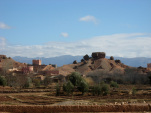
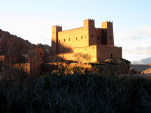
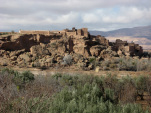
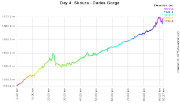
GPS track -
Day 5: Dades Gorge and Boumalne Dades - Tinerhir - Todra Gorge. 77 Km. We started the day continuing our
route through the Dades gorge. The road is quite bumpy but still the ride is quite enjoyable.
At some point (around Km 25 from Boulmane Dades) you will reach the famous
switchback were the road climbs through one of the walls of the gorge. The views at the top are definitely
worth the climb! We decided to go back at this point, but it was already past noon and we reckoned we would not make
to our next planned destination (the Todra Gorge) with the remaining daylight. Thus, we decided not to cycle
back the gorge and instead take a "taxi" (picture attached) to Boulmane Dades. From Boulmane we cycled to Tinerhir
(nice gentle downhill all the way) and from them we entered the route to the Todra Gorge. The Todra Gorge road
is very bumpy and not well maintained: expect lots of potholes, unmarked roads and quite a lot of traffic. We pitched our
tents in a nice camping by a dried river bed.
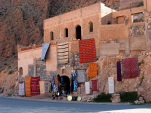
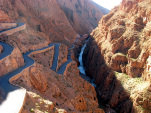
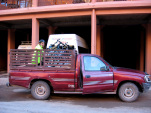
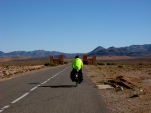
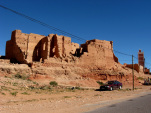
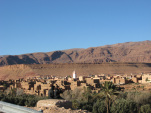
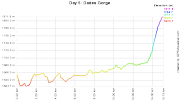
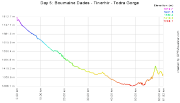
Dades Gorge GPS track
Boumalne Dades - Todra Gorge GPS track -
Day 6: Todra Gorge - Tinerhir - Goulmima. 84.3 Km. Except for a relatively steep uphill at the
beginning, this was a very easy day: flat or downhill all the way!. During our route we saw some camels
(dromedaries actually); although they are not
true "wild" animals (they do have an owner) they are left to roam free around and make a very interesting
sighting. We arrived to Goulmina with plenty of time to choose were to pitch our tent. Since we couldn't
find a proper camping in the city we opted to ask around for someone who would let us stay in their garden. For
a small sum we camped at the gardens of a guest house (Maison d'hotes Les Palmiers) in the city center.
Goulmina is an interesting place, one could not say it's a beautiful city but has some charm. A walk through the
city market streets is always an interesting pastime.

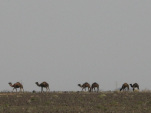
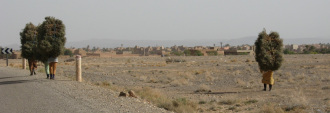

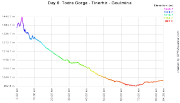
GPS track -
Day 7: Goulmima - Errachidia. 60.5 Km. Our last day!. There is a very steep climb just outside Goumima. We
left early and this hill surely woke us up! The rest of the route is relatively flat; no big hills but loads
of small ups and downs. This made this last leg of the route not trivial, particularly with strong winds. Once
in Errachidia we went directly to the bus station.
There are several bus services from Errachidia to all the important cities in Morocco. As per Moroccan standards, we didn't even have time to get to the ticket counter before we were approached by several "bus managers" asking us were did we wanted to go and offering us much better prices than we could get through the ticket office. Being tired and just wanting to get to Fez, we got into one of these buses that "surely" was faster and cheaper than the official bus line. Our bikes were put on top of the bus with the rest of the luggage (expect to pay a little present to the carriers, a couple of lighters did it in our case) and off we went. It took us 10 hours to cover the 300km distance between Errachidia and Fez, stopping at every single village along the way (or just in the middle of nowhere) to pick up more passengers. In any case, an interesting experience in itself.
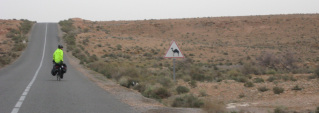
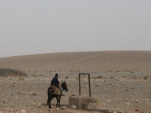

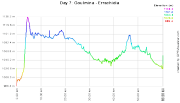
GPS track
